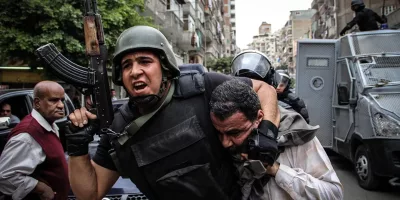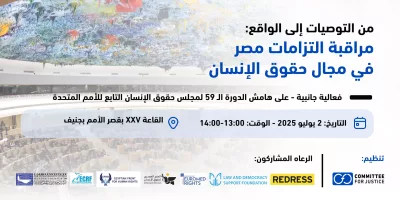Press release
Translated by Committee for Justice
Geneva: April 11 2022
The Executive Director of the Committee for Justice, Ahmed Mefreh, stressed that the importance of the Regeni case lies in the fact that it is the only case among more than a thousand deaths inside Egyptian prisons and detention centres that were referred to trial and investigated independently.
During the trial session of the Egyptian security officers accused of torturing and killing Italian master’s student Giulio Regeni, in the Italian capital, Rome, on Monday, Mefreh said: “Extending the judicial process in this way will help the criminals to get away with murder.”
The Pre-Trial Chamber of the Rome Court yesterday postponed the decision on the referral of the Egyptian officers accused of killing Regeni to the Criminal Court to the October 10 session.
Helping culprits escape justice:
On this postponement, Mefreh commented: “For the second time, the killers of the Italian student benefited from fair trial procedures by obligating the Public Prosecutor and the Italian investigation authorities to officially inform the four accused Egyptian officers of their referral to trial, which is the most important condition for the continuation of the case and its referral to the criminal court again.”
Mefreh stressed that the organization respects the path of justice against all the accused, including the four Egyptian officers. At the same time, extending the judicial process in this way and the complexity of the case, in light of the intransigence of the Egyptian side and the failure of the Italian side to assist in the technical procedures, leads to impunity. And the main responsibility for this lies within the Egyptian side, which the Italian judicial authorities should take into account.
In Egypt, a new Regeni every day:
“Every day, there is a new Regeni in Egypt, the last of whom is the economic researcher, Ayman Hadhoud, and it is a clear message from the Egyptian regime that it is proceeding nonstop in killing its opponents, whether by killing under torture, as in the cases Regeni and Hadhoud, or gross medical negligence, or poor care, which resulted in the death of approximately 1,150 detainees so far.”
The events of the case date back to 2016, when the dead body of the Italian student, Giulio Regeni, who was conducting research on Egyptian trade unions, was found in Cairo. The Italian judiciary charged four Egyptian officers in absentia on suspicion of the brutal murder of the Italian student in Cairo: Major General Tariq Saber, Colonels Asser Kamel Muhammad Ibrahim, Hussam Helmy, and Major Ibrahim Abdel-Al Sharif.






